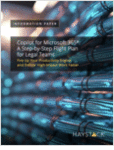Critics of business method patents were none too happy on Friday, when the U.S. Court of Appeals for the Federal Circuit once again endorsed a controversial patent owned by Ultramercial LLC. But someday they may be grateful for the decision. By forcefully defending Ultramercial's patent, the Federal Circuit might have given the U.S. Supreme Court an attractive vehicle for limiting the patent-eligibility of business method patents next term.
In a 3-0 decision, the Federal Circuit ruled that Ultramercial's patent, which covers a method of displaying advertisements on the Web, is not a "abstract idea," and therefore is eligible for patent protection. The ruling is a blow to the video game company WildTangent Inc., which Ultramercial has accused of infringing the patent. Chief Judge Randall Rader wrote on behalf of the court. Judge Alan Lourie wrote a concurring opinion.
If you experienced déjà vu reading the previous paragraph, it's because the Federal Circuit came to that same conclusion back in 2011. That decision was vacated by the U.S. Supreme Court in May 2012. Rather than issue a decision of its own, the Supremes remanded the case back to the Federal Circuit for further consideration in light of its ruling in Mayo Collaborative Services v. Prometheus Laboratories Inc., in which the court invalidated a diagnostic testing patent.
When the Supreme Court vacated Rader's prior decision, the blog PatentlyO interpreted the maneuver as a challenge to Rader's broad view of patent-eligibility–an extremely hot-button issue in patent law, as we explained here. Since then, disagreement between the two courts has only gotten stronger. In Mayo, as well as this month's gene patenting decision, Association for Molecular Pathology v. Myriad Genetics Inc., the Supreme Court has unanimously struck down patents on the grounds that the claimed inventions were never eligible for patenting in the first place, reversing the Federal Circuit each time. Meanwhile, Federal Circuit judges have been all over the map on the issue. Practitioners hoped that the Federal Circuit's en banc decision from May in CLS Bank v. Alice Corporation would offer clarity, but instead the court issued a splintered and muddled seven-part opinion.
According to Julie Samuels of the patent reform nonprofit Electronic Frontier Foundation, Rader's decision from Friday further underscores the rift between the two appellate courts. "The Ultramercial decision almost ignores Prometheus and Myriad," she said. "The Federal Circuit doesn't seem to be following Supreme Court precedent."
Samuels said that her view is supported by Judge Laurie's concurring opinion. "I write separately because I believe that we should concisely and faithfully follow the Supreme Court's most recent guidance," he wrote.
Could Ultramercial be destined for the Supreme Court? The Supremes haven't been shy about addressing patent-eligibility. And both Myriad and Prometheus dealt with biotech patents, so confusion still reigns over the patent-eligibility of business methods and software. The lead lawyer for the defendants in the Ultramercial case, former U.S. Solicitor General Gregory Garre, now of Latham & Watkins, told us his clients are considering Supreme Court review but declined to comment further.
Weil Gotshal & Manges partner Ed Reines said he wouldn't be surprised to see the Supreme Court grant cert in either Ultramercial, CLS Bank, or both. "We could end up with a quartet of high court rulings that shrink what is patentable," he told us, including the Prometheus and Myriad decisions in his reckoning.
Ultramercial's patent has drawn lots of public backlash, offering patent reformers a compelling candidate to take the battle back to the Supreme Court. And by issuing a relatively forceful decision on Friday, Rader teed up the central issues nicely for appeal.
Paul Schoenhard of Ropes & Gray agreed that there's a good chance that the Supreme Court will revisit the patent-eligibility of business methods, but said that Ultramercial may not be the case because of its procedural posture. He noted that the case was dismissed in U.S. district court on an early motion to dismiss, so there's not much in the evidentiary record besides the patent itself. In past cases to garner Supreme Court review, like Myriad and Prometheus, "the courts or the patent office had engaged in a relatively full review," he said.
Lawrence Hadley of McKool Smith Hennigan, who represented Ultramercial, did not return a call seeking comment.
This article originally appeared in The Am Law Litigation Daily.





